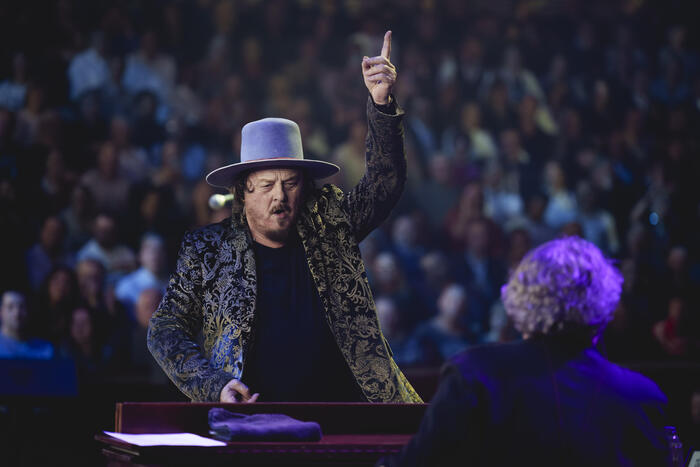Easy to care for, that doesn't suit Günther Groissböck.
Just listen to the program of his CD "Not again!" Even during the pandemic, the bass player didn't mince his words.
A conversation about his latest album and the Corona aftermath.
You have put together a very dark to nihilistic program for your CD. Typical Austrian?
Rather typical of my song programs.
Beginning with the "Winter Journey" to the "Swan Song" and the self-compiled CD "Herztod", the programs often turn out like this.
It is always a question of which repertoire is particularly suitable for deep voices.
In a London concert, for example, I sang the second part of "Not Again!" and noticed how people were gripped by it.
A stringent, logical and dark cycle of soldiers' songs came about as a program experiment, so to speak.
Isn't it difficult to confront the audience with this violent literature after the past two and a half years?
I'm aware that I have to pick people up somewhere and that it can be quite problematic to do it where they might not necessarily want to be picked up.
However, I find the statements of these pieces very important.
Maybe I'm a discontinued model - but in this respect one out of conviction.
In art, we have to be careful that after times of great crisis we don't just offer trivial, easily digestible things à la "Forster vom Silberwald" or the 25th CD with kitschy Christmas carols.
So no new pseudo-Biedermeier, as happened after the Second World War, for example.
We have to stick to the content.
Among other things, you sing Strauss's "Appropriation", a popular, light encore piece. A shadow falls on it now.
In general, it is fascinating with songs that they are illuminated in a new way depending on the voice and often completely new perspectives open up.
When it comes to “Appropriation”, I always have Jessye Norman in mind or ears with her classic diva encore.
But another approach is also possible.
And the listener has the opportunity to choose what they feel is right and appropriate.
So you also have a black soul?
If you like: yes.
I just sang the "Rosenkavalier"-Ochs in Vienna, then in Munich Kezal in the "Verkaufte Braut", both comic roles.
And if I have something like that in the calendar, I need a kind of counterweight - so that my other side can be shown.
"Not to see you again!" was a kind of self-cleansing process.
So some things have a very personal connection.
In this respect, it's a nice thing when you can use the song constructively, artistically and cathartically.
Self-cleaning: What was there that had to go?
All sorts of experiences, adventures, disappointments.
Everything that catches up with you in everyday life and that you have to face.
This music also offers a kind of therapeutic possibility.
Edita Gruberova always said that without singing she would have had to see a psychotherapist all the time.
It's the same with me.
I could become a challenging case for society if I didn't do this job.
Jokes aside: I would find something else... But you have things inside you that have to come out.
With Mahler and Strauss we also immerse ourselves in a time that certainly has parallels to the present.
Added to this is the timeless message of great art.
Can a non-Austrian or non-German also feel the statements made by Mahler and Strauss?
Yes.
I think it's a fundamental mental thing.
Of course, if you grew up around Mahler or Bruckner, you're somehow closer.
It's not just about the immediacy of experiences, but also about images, impressions, landscapes that the composer saw, felt and smelled.
How immediate do these emotions need to be presented? How important is distance when interpreting a dark song?
It is clear that one is touched.
That's why so much distance is necessary that you can still function as a singer.
That's very difficult, especially with pieces like Strauss's "Befreit", this farewell song, because you're drawn into it incredibly quickly.
Normally it's like this with a CD recording: you do two or three takes and listen to them first of all in terms of cleanliness, i.e. intonation, rhythm and so on.
We had the case with "Not Again!" that there was a very good version of a song.
But then I asked the production manager: "Hamma not something that's a little more dirty, what hurts a little?
Which is more tormented?” I always prefer the version that is most direct and authentic, while still being technically viable.
They are doing very well on the stages at the moment. Has everything returned to normal after the Corona period?
It's kinda crazy.
On the one hand, some things have changed, on the other hand, the deadline situation has sometimes even tightened.
For example, when I canceled the Bayreuth "Wotan", there were initially gaps in the calendar.
But they filled up almost like an avalanche.
You have often expressed your anger at the corona measures during the pandemic. Has the anger subsided?
You could write a book about that now.
Let's put it this way: There is a level on which life has to go on now, even when meeting people whose character was and is rather questionable.
Ugly abysses have opened up during this time, also among colleagues.
Opportunism, cowardice and denunciation of a kind one would not have thought possible.
On the other hand, I've learned over the past two and a half years that I need to focus on what I'm good at and what I was probably born to do.
You have to avoid certain struggles and perhaps take on new perspectives.
Also, as far as your own points of view are concerned: where was one too bold?
Too clear?
Or too early with the opinion?
In some areas it gets almost philosophical:
For example, what do people accept as reality?
What do I have to accept because people take it for reality?
Those were all pretty tough tests.
Also with regard to your own perception.
Whereby dealing with songs and opera roles, with model conflicts, so to speak, could help.
Clear.
With the Mahler songs, for example, you can always feel the enthusiasm of the people before the First World War, which makes you ask yourself from the distance: how did it actually come about?
Or how could this kind of fanaticism and bondage come about in the past two and a half years?
Ultimately, these are collective patterns that unfortunately seem to appear again and again.
Especially in the time before the First World War, there was often only black or white. Intermediate levels of opinion were frowned upon - which affected the openness of the discussion culture.
Difficult, highly complex thing.
I agree.
As an artist, I see my task as, among other things, encouraging people to think for themselves, and above all to feel.
We are more or less responsible for extended feeling.
And of course for breaking through all kinds of thinking corridors.
The interview was conducted by Markus Thiel.
Concert
on January 22nd at the Prinzregententheater;
CD
: "Don't see me again!" with pianist Malcolm Martineau, published by Gramola.







